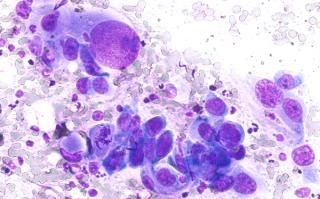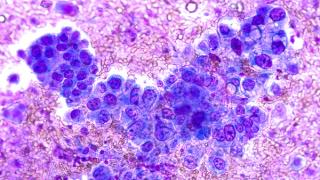
Non-Small Cell Lung Cancer
Latest News

Latest Videos

CME Content
More News
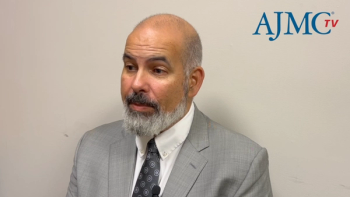
Jorge Nieva, MD, highlights the critical role of molecular testing in non–small cell lung cancer (NSCLC) care, while addressing barriers such as limited tissue samples, delayed turnaround times, and the need for faster, more accessible diagnostic technologies.
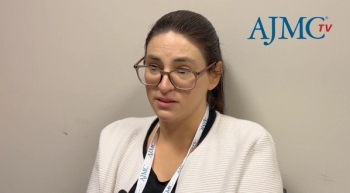
Lauren Antrim, MD, of City of Hope Cancer Center Duarte, emphasized the need for more evidence to guide optimal immunotherapy duration and sequencing in in non–small cell lung cancer (NSCLC), highlighting ongoing trials and the potential role of ctDNA in tailoring treatment strategies.
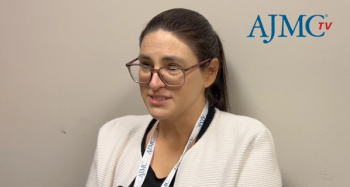
Lauren Antrim, MD, emphasized the need to balance safety, efficacy, and financial considerations when managing immune checkpoint inhibitors in NSCLC, underscoring the importance of patient-centered discussions and ongoing trials to refine treatment duration strategies.

The definition of comprehensive non-small cell lung cancer (NSCLC) testing is rapidly evolving with new biomarkers and therapies, according to Julia Rotow, MD, creating added challenges for community practices.
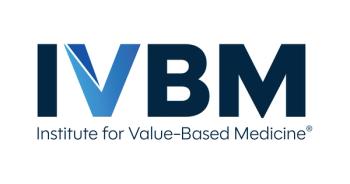
Precision oncology's promise was the key theme of the July 17 session of the Institute for Value-Based Medicine with faculty from multiple institutions in the Boston, Massachusetts area.

New drugs aren't the only advances in oncology. Innovation includes collaboration between to remove barriers to remove barriers to care, according to experts who gathered for a session of the Institute for Value-Based Medicine in Arlington, Virginia.

Cutting-edge cancer therapies and innovative care models that advance patient access and significantly reduce health care costs took center stage at the Institute of Value-Based Medicine (IVBM) event in Minneapolis, Minnesota.

Selected patients with a clinical response after therapy could benefit from salvage surgery in non–small cell lung cancer (NSCLC), with acceptable results for perioperative morbidity.

The newly developed model has an area under the curve of 0.807 for predicting progression-free survival.

Zongertinib gains FDA approval for treating HER2-mutated non–small cell lung cancer (NSCLC), offering hope with fewer side effects and promising response rates in patients.
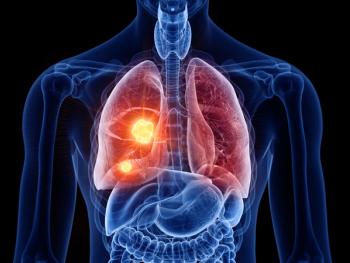
Bevacizumab combined with chemotherapy was not as effective in advanced driver gene-negative nonsquamous non–small cell lung cancer (NSCLC) compared with immune checkpoint inhibitors plus chemotherapy.

Seventy percent of Asian American and Pacific Islander women diagnosed with lung cancer were non- or never-smokers, highlighting a need to rethink lung cancer screening to reduce disparities.

There is a great need to streamline the process from the tissue sample to the diagnostic lab, whether it's genomic or immunohistochemistry, Robert Kratzke, MD, says.

Tabby Khan, MD, MPH, senior director of Analytics at Komodo Health, calls for increased lung cancer screening measures and criteria to address underreported, at-risk populations like AAPI women.

Robert Kratzke, MD, urged insurance providers to prioritize fast biomarker testing in non–small cell lung cancer, saying it’s both cost-effective and life-saving.
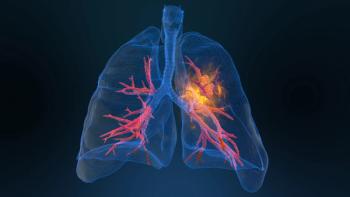
The hemoglobin, albumin, lymphocyte, and platelet (HALP) score can help to guide treatment decisions in patients living with non–small cell lung cancer (NSCLC).

New research reveals critical gaps in treatment for advanced non–small cell lung cancer (NSCLC), emphasizing the need for innovative therapies to improve patient outcomes.

The treatment marks the only targeted oral treatment in patients with non–small cell lung cancer with epidermal growth factor receptor exon 20 insertion mutations.

The COCOON trial reveals that prophylactic treatment reduces dermatological adverse events in NSCLC patients, enhancing their quality of life during amivantamab therapy.

Zongertinib shows promising results in HER2-mutant NSCLC, offering high response rates and improved quality of life with minimal toxicity.

The FDA approved datopotamab deruxtecan-dlnk (Datroway; Daiichi Sankyo) for the treatment of locally advanced or metastatic EGFR-mutated non–small cell lung cancer (NSCLC) after receipt of EGFR-directed therapy and platinum-based chemotherapy.


Artificial intelligence (AI) provides a major tool in the evolution of thoracic care, as clinicians work to catch lung cancer earlier to provide better prognosis.
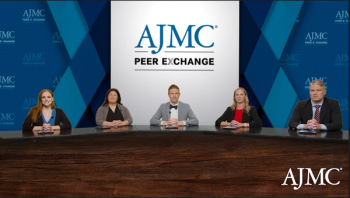
Panelists discuss how promising ongoing and upcoming clinical trials may reshape sequencing strategies in ALK+ non–small cell lung cancer (NSCLC).

Panelists discuss how to approach patient education after progression on an ALK inhibitor, address real-world challenges during therapy transitions, and determine best options for patients progressing on lorlatinib.






